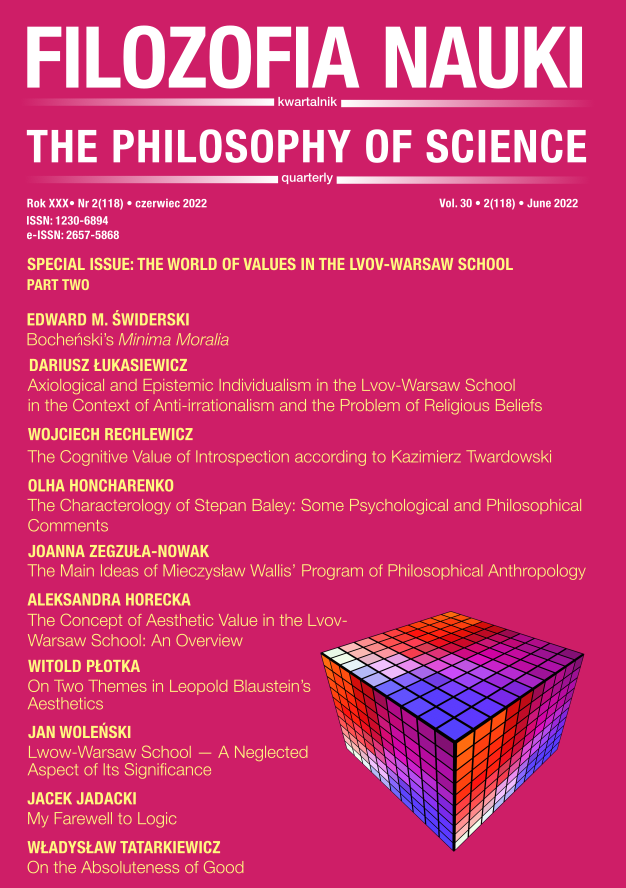Bocheński’s Minima Moralia
DOI:
https://doi.org/10.14394/filnau.2022.0015Słowa kluczowe:
wisdom, metaethics, naturalism, anthropocentrism, humanism, autonomy, heteronomy, substantive ethicsAbstrakt
Late in life, Józef Maria Bocheński set out to examine the age-old preoccupation with the question “how to live as well and as long as possible?” A traditional answer has been, “live wisely.” In his Handbook of Worldly Wisdom (2020), Bocheński analyzes this answer arguing that, conceptually, living wisely is distinct from obeying moral commandments, prescribing ethical rules, and recognizing authority (e.g., piety, free submission to divine authority). He claims that ethics consists solely in what moral philosophers label as “metaethics” — a theoretical discipline interested in the conceptual status of moral discourse qua discourse. However, Bocheński remains silent about a substantive ethics — that is, how a life led one way or another subscribes to some guiding value-set. As regards wisdom, therefore, the consequence of this position is that Bocheński’s account is ethically neutral. I argue that such a position entails a tension and dichotomy between, on the one hand, prudential rationality concerned with getting on in the moment — that is, wisdom — and, on the other hand, unconditional moral commandments. For his part, Bocheński does not recommend living according to wisdom’s precepts as he analyses them; his own path through life, he tells us, has been a commitment to Christian values, piety abetted by observance of moral commandments, a perspective that, I submit, is not ethically neutral: on the contrary, it entails thick, substantive value-choice. Bocheński’s avowal suggests a second dichotomy and tension, that between the worldly conduct of life, with moderate acknowledgment of moral principles, and an extra-worldly perspective (the “folly of the Cross”). Bocheński does not attempt to resolve either dichotomy, to seek a possible point of their convergence and integration, for instance by inquiring into moral psychology (i.e., the construction of self, the nature of the will, etc.). I believe that this set of views stems from conclusions Bocheński reached in advance of producing the Handbook that bear on, first, how philosophy should be conducted — as logical analysis hostile to grandiloquent speculation and synthesis (“worldviews”); and second, his utter dismissal as nefarious of anthropocentric views. Indeed, Bocheński asserts, without a blush, that almost everything “we” have come to believe about ourselves is superstition writ large. I trace what I consider to be difficulties with Bocheński’s account of wisdom — in relation to his take on morality, (meta-)ethics, and piety — to these idiosyncratic views.
Bibliografia
Bocheński J. M. (1956), Formale Logik, Freiburg–München: Karl Alber (Translation: A History of Formal Logic, South Bend: Notre Dame University Press, 1961).
Bocheński J. M. (1964), Wege zum philosophischen Denken. Einführung in die Grundbegriffe, Freiburg: Herder.
Bocheński J. M. (1965a), The Logic of Religion, New York: New York University Press.
Bocheński J. M. (1965b), The Methods of Contemporary Thought, Dordrecht: D. Reidel. https://doi.org/10.1007/978-94-010-3578-1
Bocheński J. M. (1974a), “Logic and Ontology,” Philosophy East and West 24(4), 275-292. https://doi.org/10.2307/1398384
Bocheński J. M. (1974b), Was ist Autorität?, Freiburg: Herder (republished as “Autorität” [in:] Autorität, Freiheit, Glaube, München: Philosophia Verlag, 1988, 9-106).
Bocheński J. M. (1975), “Selbstdarstellung” [in:] Philosophie in Selbstdarstellungen, L. J. Pongratz (ed.), Hamburg: F. Meiner Verlag, 11-36.
Bocheński J. M. (1987), Sto zabobonów. Krótki filozoficzny słownik zabobonów, Paryż: Instytut Literacki.
Bocheński J. M. (1988), “Philosophie und Weltanschauung” [in:] Autorität, Freiheit, Glaube, München: Philosophia, 173-189.
Bocheński J. M. (1990a), “The Spiritual Situation of the Age,” Studies in Soviet Thought 40(1-3), 257-266. https://doi.org/10.1007/BF00818984
Bocheński J. M. (1990b), Entre la logique et la foi: Entretiens avec Joseph M. Bocheński recueillis par Jan Parys, Montricher: Editions Noir sur Blanc.
Bocheński J. M. (1990c), „Sens życia,” Kultura 1-2(388-389), 3-16.
Bocheński J. M. (1991), “Did We Not Waste Our Time?,” Studies in Soviet Thought 42(3), 295-302. https://doi.org/10.1007/BF00818795
Bocheński J. M. (1993), Wspomnienia, Kraków: Philed.
Bocheński J. M. (1995), Etyka, Kęty: Antyk.
Bocheński J. M. (2020), Handbook of Worldly Wisdom, translated with an Introduction by E. M. Świderski, München: Philosophia.
Frankfurt H. (1988), The Importance of What We Care About, Cambridge: Cambridge University Press. https://doi.org/10.1017/CBO9780511818172
Frankfurt H. (2004), The Reasons of Love, Princeton: Princeton University Press.
Kołakowski L. (1989), The Presence of Myth, Chicago–London: The University of Chicago Press (first published as Obecność mitu, Biblioteka Kultury, t. 224, Paris: Institut Littéraire, 1972).
Korsgaard C. (1996), The Sources of Normativity, Cambridge: Cambridge University Press. https://doi.org/10.1017/CBO9780511554476
Lobkowicz N. (2003), “Über Werte,” Studies in East European Thought 55(4), 367-388. https://doi.org/10.1023/A:1025348310321
Policki K. (2005), Filozofia człowieka w wczesnej twórczości J. I. M. Bocheńskiego O.P., Wrocław: Papieski Wydział Teologiczny we Wrocławiu.
Woleński J. (2021), “Beyond Logic There Is Only Nonsense,” Studies in East European Thought. https://doi.org/10.1007/s11212-021-09431-4
Zembrzuski M. (2021), “Józef Maria Bocheński jako tomista,” Rocznik Tomistyczny 9, 267-291.



















 Filozofia Nauki | ISSN 1230-6894 | e-ISSN 2657-5868
Filozofia Nauki | ISSN 1230-6894 | e-ISSN 2657-5868